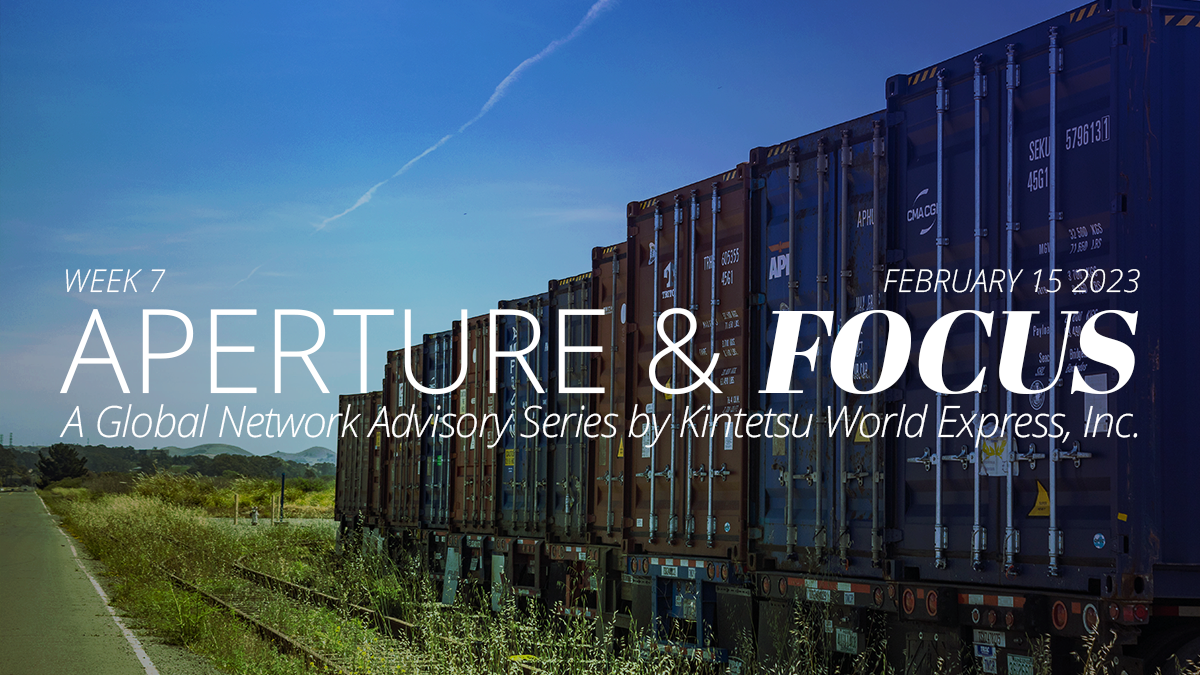Quote
Aperture & Focus 2023: Week 7

Regional Focus
Americas
After a Seattle terminal dispute in September of last year led to a lengthy hiatus, West Coast labor talks between the Pacific Maritime Association and the International Longshore and Warehouse Union resumed once again when both sides agreed to set the issue aside with renewed focus on other issues. Volumes continue to drop, however, as negotiations enter their 10th month and industry experts predict permanent loss as carriers favor East Coast ports, weakening union leverage. On the heels of the decision from rail company CSX to offer sick leave, Congress and the White House renewed pressure on rail companies, now threatened with testimony before congress if they do not reach agreements with unions. Less than two weeks after a train carrying hazardous materials was derailed in Ohio, causing a massive fire and mandatory evacuations, two more derailment incidents in Texas and South Carolina have led rail operators to face further scrutiny on cost cutting measures.
The combined threat of rail strikes, dragging port labor negotiations, terminal congestion, and full warehouses, has taken its toll on intermodal transportation, which saw its worst January in over 10 years according to a new report from the Intermodal Association of North America, with more declines expected throughout 2023. On a positive note for infrastructure, the first and largest segment of Houston’s Ship Channel Expansion Project has officially been completed, allowing larger ships to pass through while increasing safety and reducing transit times.
Asia-Pacific
Declining cargo demand in China and a large number of blank sailings out of the region has led to many carriers adding services to India to improve capacity utilization. While trade conditions have caused volumes to drop globally, India’s export growth from last year and redrawn routes supporting energy trade, have expedited this growing trend. As India is one of the countries that has not explored a price cap on Russian crude oil, the increased capacity has encouraged Indian refiners to explore importing Russian oil for domestic supplies and exporting Indian oil for foreign markets. On February 15, India will allow the handling of transshipment cargo from Bangladesh at the Delhi Air Cargo Complex, introducing a new air-sea route for Bangladeshi exports and drastically improving cargo time to final destination for many over Kolkata, the next-closest available port complex.
Europe, Middle East & Africa
Five days after a massive fire broke out at Turkey’s Iskenderun Port following a magnitude 7.8 earthquake on February 6, Turkey’s maritime authority announced that the port operations had resumed and would continue as clean up and rehabilitation took place. While many major carriers have offered free amendments, cancelations, and diversion to other nearby ports through the end of February, communication with the port is still difficult due to damaged infrastructure and relief efforts are reportedly still limited.
On February 10, the German Federal Council voted to extend the ordinance that gives priority to freight trains that carry energy supplies until March 31 amid Germany’s ongoing energy crisis. That same day, Freight rail services were suspended in South Africa’s North-East Corridor amid heavy rains, halting the nation’s crucial link to five other African nations. In sharp contrast, rivers around the world that are experiencing record low water levels amid prolonged drought, including the US Mississippi River, China’s Yangtze River, and Europe’s Rhine River, are exploring solutions to avoid future bottlenecks like diversification of intermodal transport and deepening waterways to prevent closures.